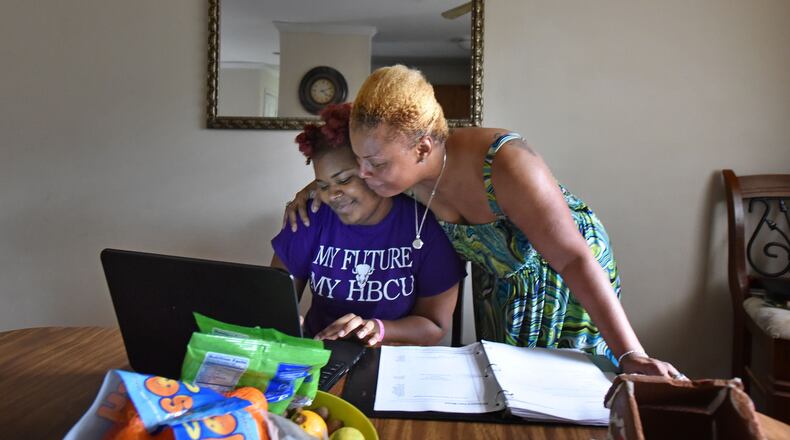The text to Kennady McAfee read “Free College.”
“For real?,” the now 19-year-old thought as she dialed Kimberly Scott, the mentor who sent it.
Well, not exactly free. But Arkansas Baptist College was offering free meal plans, help securing campus jobs and more.
But free always comes with a catch: Little Rock was a 10-hour ride away. And her mother—raising 8 children on her own—needed her.
McAfee’s family was homeless and living out of a hotel when she graduated from Atlanta’s Coretta Scott King Young Women’s Leadership Academy last year. After graduation she went to work packing boxes in a warehouse.
College was a path towards stability. An opportunity to fulfill the dream of owning her own business that she’d put on hold to help support her family.
McAfee took her chance. Early one morning last year, she boarded the bus to Little Rock.
She is one of more than 100 Atlanta-area students who have enrolled in recent years at Arkansas Baptist, a small historically black college, drawn through word of mouth, inducements from the school and support from mentors, local businesses and an Atlanta school board member.
As schools in metro Atlanta and nationally focus on enrolling students in postsecondary education, this low-key partnership has quietly funneled area students—some of who never thought college was for them—into higher education.
“It’s just the community people coming together and helping kids,” said Atlanta school board member Steven Lee.
Lee, whose son attends Arkansas Baptist, has coordinated community support for the students; a local lawyer is donating school supplies and a radio host raised money for chartered buses.
Like some of its students, Arkansas Baptist has its struggles.
The school, which currently enrolls about 1,000 students, is under the strictest level of federal financial monitoring due to concerns about its administrative capability. It's more expensive on average than local schools like Georgia State University and Atlanta Metropolitan College. And its graduation rate—15 percent—is well below the national average.
That low rate is due in part to the school’s open enrollment policy, President Fitz Hill says.
“I’m not big on test scores being the determining factor on a person having an opportunity,” he said.
Seventy percent of students are from families making less than $40,000 a year and about the same percent are African American men.
The school is in the midst of a transformation, he said.
The school's finances are stabilizing, he said. It recently received a $30 million federal loan, finished building two new dorms and launched new academic programs. This year, Arkansas Baptist expects to graduate the largest class in its 132-year history.
“We’re giving kids opportunities and as long as they’re willing to work…we have the obligation to make that happen,” Hill said.
Since 2012, 139 Atlanta-area students have matriculated at the school, Hill said.
Eighty-three percent have either graduated with associates degrees or are still enrolled, he said. Federal data shows about 40 percent of all full-time Arkansas Baptist students return after their first year.
Christian Williams was one of those who left. She got fed up with problems with her financial aid and dorm conditions—and then her mother got sick and lost her job. Now she’s back in Atlanta, working to pay back the $1,000 she owes the college so that she can get her transcript, enroll at a local school and earn a nursing degree.
“I don’t think it was a bad thing,” she said of heading to Arkansas. “It got me more mature.”
The night before the bus left last year, Kimberly Scott, who runs a women’s mentoring and leadership program, checked with a few of her students to make sure they were ready. Realizing some lacked the necessities for college life, she stopped at Walmart and arrived at the bus parking lot with tote bags of linens, toiletries and school supplies— “the basic stuff a young lady needs for college.”
Some of the students could have enrolled at local schools, she said. But sometimes young people—especially those who have been through so much—need to get out of Atlanta, she said.
At first, “They’re like, ‘What do you mean I can leave?’” she said. “Then it’s like, ‘I want to be gone; I want to leave Georgia. There’s got to be another world out there.”
About the Author
Keep Reading
The Latest
Featured


